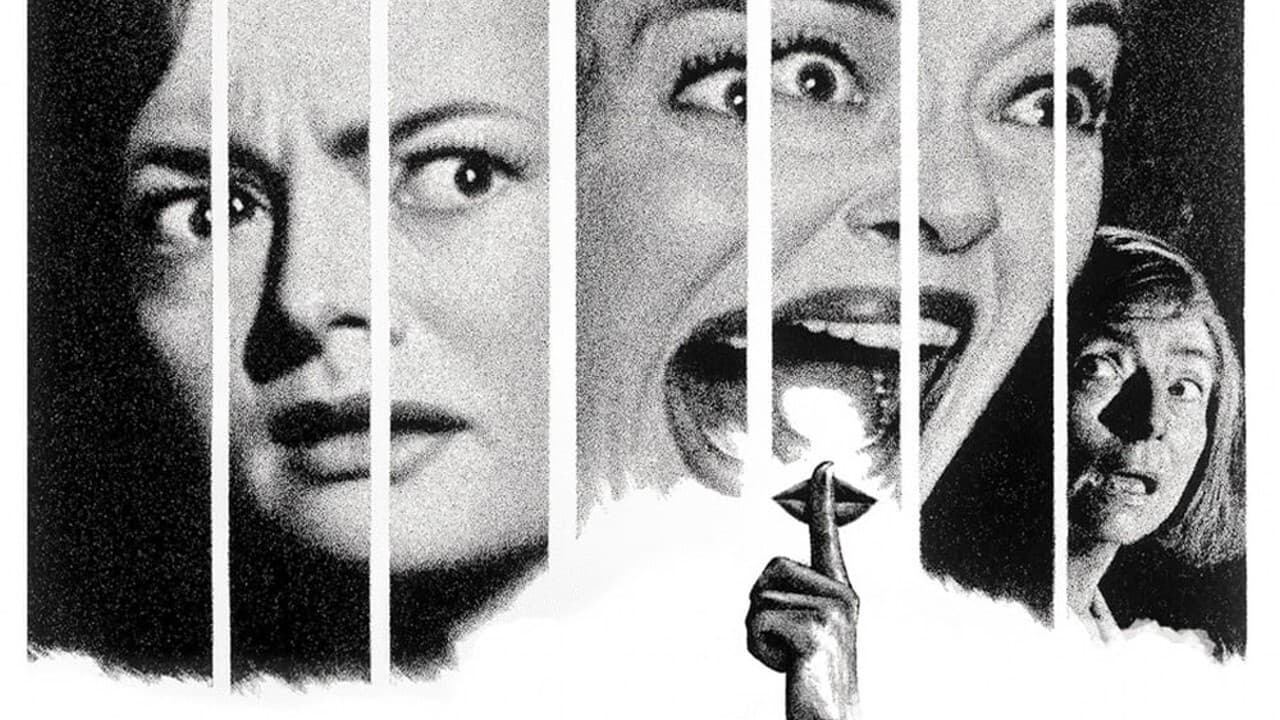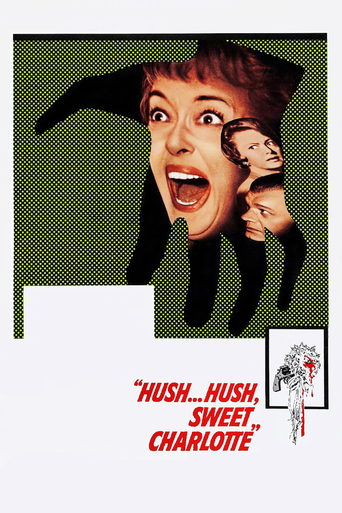ManiakJiggy
This is How Movies Should Be Made
pointyfilippa
The movie runs out of plot and jokes well before the end of a two-hour running time, long for a light comedy.
Asad Almond
A clunky actioner with a handful of cool moments.
bsmith5552
"Hush, Hush Sweet Charlotte" was intended as a follow-up to the highly successful Bette Davis/Joan Crawford/Robert Aldrich success, "Whatever Happened to Baby Jane?" (1962). However, after filming had begun, Crawford began causing lengthy delays through her frequent "illnesses" and hissy fits. She was subsequently removed from the project and replaced by Olivia DeHavilland.The story opens in a 1927 prologue where rich and powerful southerner Big Sam Hollis (Victor Buono) is confronting his daughter Charlotte's illicit lover, the married John Mayhew (Bruce Dern). He cajoles the man into breaking up the affair just as the couple were about to run off together. That same evening, Mayhew is brutally murdered and Charlotte is assumed to have committed the act.Fast forward to 1964 where we find Charlotte (Bette Davis) living as a recluse in the Hollis mansion with her creepy servant Velma (Agnes Moorehead, Big Sam having died several years earlier. The mansion however, is slated for demolition and Charlotte is being forced to abandon her home. In the meantime she is being comforted by Dr. Drew Bayliss (Joseph Cotton) her family doctor. Charlotte sends for her cousin Miriam (De-Havilland) to help her face this crisis.A British journalist, Harry Willis (Cecil Kellaway) arrives on the scene to investigate the original unsolved crime of 37 years earlier. He interviews the murdered man's widow Jewel Mayhew (Mary Astor) who provides some insight. She gives him an envelope to be opened only upon her death.Meanwhile back at the mansion, we learn of a plot between Dr. Drew and Miriam to drive Charlotte insane in order to get their hands on Charlotte's considerable fortune. As they proceed with their plans, things go awry and.............................................Bette Davis was becoming adept at playing slightly off their rocker middle aged ladies. Charlotte was no exception. She moves from sanity to unstable moments quite convincingly. The moment that she finally literally scared out of her wits is mesmerizing. DeHavilland, still showing bits of her "Melanie Wilkes" character form "Gone With the Wind", makes her nasty side seem more believable. Cotton as always, is excellent as the two faced doctor.Victor Buono, who is billed as a guest star, impresses as Big Sam. Buono, who never got the recognition he deserved, was only 26 years old at the time of this film. Agnes Moorehead almost steals the film as the mysterious housekeeper. Also in the cast are George Kennedy as the demolition foreman, William Campbell as a reporter for a crime magazine, Frank Ferguson as the newspaper editor and Dave Willock as a taxi driver.I wonder how the film would have been received had Joan Crawford not been fired?
lasttimeisaw
Originally a star vehicle to reunite Bette Davis and Joan Crawford after the runaway success of WHAT EVER HAPPENED TO BABY JANE? (1962), HUSH…HUSH, SWEET CHARLOTTE intended to continue cashing in on projecting their backstage rivalry onto the theatrical canvas of a grueling tale with a similar theme, with Robert Aldrich staying in the director's chair. But when the personal collision between Ms. Crawford and Ms. Davis escalates (as Aldrich, the intermediary, failed to juggle with these two high-maintenance divas this time), also for fear of being upstaged again by Ms. Davis, who insinuates herself into gaining an upper hand during the production for a showier role, Ms. Crawford bowed out completely from the picture by feigning illness, and Ms. de Havilland, a long-time friend of Ms. Davis, was brought to fill her shoes in the eleventh hour. Whereas the legendary off-camera feuding is still of great interest up to a point (Ryan Murphy has an upcoming series named FEUD, starring Susan Sarandon as Davis and Jessica Lange as Crawford, to chronicle the infamous anecdotes for today's audience), the movie per se is a marvel of its own. A prelude sets in Ascension Parish, Louisiana in 1927, effectively tampers its Dixieland gaiety with a grisly tinge when John Mayhew (Dern), a married man, is brutally butchered after his elopement plan with Charlotte has been thwarted by the latter's father Big Sam Hollis (Buono, in a brief but menacing performance bolstered by a heavy make-up to play a character nearly doubles his real age). Then, the story fast-forwards to 1964, 37 years later, Charlotte (Davis), now a faded southern belle, presumably the murderer of her beau, never gets married and lives alone in her father's mansion like a demented recluse, her sole accompanies are the housekeeper Velma Cruther (Moorehead) and Dr. Drew Bayliss (Cotten), who occasionally comes to attend to her well-being. When the estate is on the risk of being torn down by the government in favor of building a bridge, Charlotte seeks help from her cousin Miriam Deering (de Havilland), the only family member she has presently, invites her to stay under the same roof first time after the horrific happening, but many many strange things ensue to drive her further down into lunacy. The intriguing whodunit has been brilliantly contrived as a collision course of no-holds-barred collision course between two leads, and is fraught with pathos and suspense through its full- throttle noir atmosphere, actually, the picture must represent the apotheosis of chiaroscuro cinematography, captured to a mesmerizing effect by DP Joseph Biroc, lights, shades, shadows and facial close-ups all being flawlessly framed against the haunting tableaux where threats and secrets skulking insidiously in the darkness, just like Charlotte's disconcerting confession "It's only real when it's dark". The sequences blurring the line of reality and imagination are extraordinarily conceived and executed, sublimate its pulpy material to cinematic surrealism. But do viewers ever question Charlotte's sanity or regard her as a heartless murderer? No, not when Ms. Davis is is her absolutely most vulnerable state, unlike in BABY JANE, here she switches to the victimized party, tormented and devilled by a past trauma and can never let it go (and someone with an ulterior motive doesn't want her to do that either), battles solitude with delusion and paranoia, marvellously, even in such a passive position, she still obstinately hams it up whenever she feels apt, which injects a perverse defiance into Charlotte's fragile persona, and when she finally gets that vindication, Bette Davis raises again, in her immutably triumphant flair. As great as Ms. Davis in her utmost fearless attempt, it is Ms. de Havilland's sinister turn hits a more rewarding mark for my money, ever so rare, she sloughs off her front of elegance, benignancy and deference, to demonstrate how deceitful, nefarious and hell-bent she could be if given the chance, it is extremely tempting to envision what Ms. Crawford could've improved from her contrasting shifting. Dishearteningly, both these two-time Oscar-winners were snubbed in the Oscar race whilst the movie surprisingly racked up seven nominations (compared with BABY JANE's five but a win for Black & White costume design), so were Mary Astor as the widow Jewel Mayhew, the splendid two- scenes stealer (also it is her final appearance on the silver screen) and Cecil Kellaway, who even- temperedly portrays the reporter Harry Willis from London, introduces a pleasant scent of well- adjusted phlegm to counterpoise the heady melodrama. Only the protean Ms. Moorehead got her fourth and final Oscar nomination in her ostentatiously uncompromising appearance as the muttering caretaker of Ms. Charlotte, but her loyalty is cunningly motivated by the vested interest, she is feisty enough to fight for what she wants against all odds, only too gormless to reveal her intention too early when standing in a perilous position, which is the same fatal mistake the villains eventually make - celebrate too soon when they still have one more show to play, a slightly bathetic feeling transpires when everything is said and done, that swell sensation from the finale of BABY JANE is seemingly nowhere to be found this time.
Fuzzy Wuzzy
Released in 1964 - Hush-Hush, Sweet Charlotte is just one of those "damned-if-you-do/damned-if-you-don't" movies where you seem to already know what's going to happen about 10 minutes before it actually does.Yes. There were a few surprises awaiting the viewer, but this "Let's-Drive-Charlotte-Insane" picture should have been, literally, loaded to the rafters with shocks & shivers galore.Upon checking this film's ratings & reviews here on IMDb I noticed that plenty of people have given high praise to both actresses Bette Davis and Agnes Moorehead for their decidedly over-the-top, scenery-chewing performances.And even though the character portrayals of these 2 women did have a compelling edge to them at the start, their exaggerated, overly-excitable histrionics quickly became quite annoying and, worse yet, something of a repugnantly twisted parody, which did not ring with any sort of essential humour.The one actress who I thought was a notable standout was Olivia De Havilland who played a very effective villainess as Charlotte's cousin, Mariam Deering. I thought that it was one of the film's biggest highlights when Mariam's sweet, chirpy facade was finally stripped away to expose the truly vicious and calculating bitch that lurked within.Now, don't get me wrong here. I wouldn't exactly say that "Hush-Hush, Sweet Charlotte" was a lousy movie, but, then again, it certainly wasn't great, either.The one thing that this film had going against it was its 132-minute running time. Had a good half-hour been skillfully edited from this picture, I think that that would have done wonders in helping to sustain this film's dragged-out suspense and, thus, keep the viewer continually interested throughout the story.While I patiently watched this 1964 Horror/Thriller it clearly donned on me how much "bargain-basement" director Robert Aldrich was (seemingly) trying to emulate the likes of Alfred Hitchcock.But, alas, Aldrich was not in Hitchcock's league and so, as a result, this film's story was very uneven, badly-paced and its cast delivered performances that could only be described as being somewhat mechanical.P.S. - I quite liked singer Al Martino's rendition of this film's title song, which was nicely timed and was appropriately sung during the final sequence of this picture's sad, guilt-ridden story.
eyesour
Watched this again just now, as although I'd seen it some time ago I'd forgotten what it was like. I remember thinking it was bad. It certainly is bad. Incredibly slow, slow, slow, and boring. Every event, especially the penultimate climax, is signalled about ten minutes before it happens. And it's of no interest, anyway. I could not care less about anything that these characters did, and shuddered at what seemed to me their excruciatingly painful, but inconsistent, accents. The writing is dreadful, the acting is wooden beyond belief --- in scene after scene these actors speak their lines mechanically, without the slightest sensation. Except for a heavy dose of ham. The pacing is funereal. The trivia note says that Bette Davis was publicly derisive of Joan Crawford's extensive location wardrobe. Was Joan Crawford in this movie ? I'd better read the cast list again.

